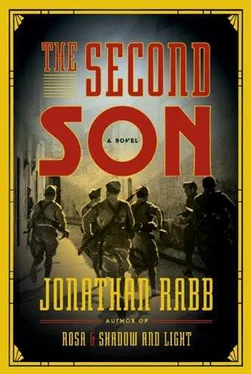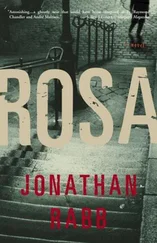Jonathan Rabb - The Second Son
Здесь есть возможность читать онлайн «Jonathan Rabb - The Second Son» весь текст электронной книги совершенно бесплатно (целиком полную версию без сокращений). В некоторых случаях можно слушать аудио, скачать через торрент в формате fb2 и присутствует краткое содержание. Жанр: Политический детектив, на английском языке. Описание произведения, (предисловие) а так же отзывы посетителей доступны на портале библиотеки ЛибКат.
- Название:The Second Son
- Автор:
- Жанр:
- Год:неизвестен
- ISBN:нет данных
- Рейтинг книги:4 / 5. Голосов: 1
-
Избранное:Добавить в избранное
- Отзывы:
-
Ваша оценка:
- 80
- 1
- 2
- 3
- 4
- 5
The Second Son: краткое содержание, описание и аннотация
Предлагаем к чтению аннотацию, описание, краткое содержание или предисловие (зависит от того, что написал сам автор книги «The Second Son»). Если вы не нашли необходимую информацию о книге — напишите в комментариях, мы постараемся отыскать её.
The Second Son — читать онлайн бесплатно полную книгу (весь текст) целиком
Ниже представлен текст книги, разбитый по страницам. Система сохранения места последней прочитанной страницы, позволяет с удобством читать онлайн бесплатно книгу «The Second Son», без необходимости каждый раз заново искать на чём Вы остановились. Поставьте закладку, и сможете в любой момент перейти на страницу, на которой закончили чтение.
Интервал:
Закладка:
“I’ll make a note,” said Hoffner. “What does it have to do with economics?”
Radek ignored him. “Is it because they have the best cars? No. Half the drivers are with Alfa-Romeo. And I don’t have to tell you what it takes to handle that tank of an Auto Union thing. Sixteen cylinders. Have you seen it, Nikolai? You have to be a beast of a man just to keep the car on the road.”
“So Rosemeyer and Nuvolari are reading Keynes?”
“Shut up, Nikolai. The point is, you’d be an idiot not to put your money on one of these two. And yet, even with the odds, people don’t. Half the money every week finds its way onto Farina or Varzi or Stuck, and these are good drivers, don’t get me wrong. But the chances, if you look at the trends”-he shook his head in disbelief-“almost impossible. So you have to ask, Why do people do it?”
It took Hoffner a moment to realize that Radek was waiting for an answer. “Primal urges?” he offered.
“Exactly,” said Radek. “They buy something with no real possibility of a return because they want to believe it can have a return. And the oddsmakers tell them to believe it can have a return. ‘This week,’ they advertise, ‘Farina will do it. He has to do it. You have to want him to do it.’ And they trust this because they live in an ordered world where, if things go wrong, they can try again the next week and the next and the next. They buy a product they shouldn’t want to buy because they so desperately want it. And that, Nikolai, is economics.”
Hoffner sat with this for a few moments before reaching for his whiskey. He took a drink. “So it’s the oddsmakers who are reading Keynes?” Hoffner expected a smile but Radek said nothing.
Franz, now running his fork through the remains of his beef, said, “I wouldn’t push it on this one if I were you.”
Hoffner smiled and looked at Radek. “We’re taking this latest theory very seriously, are we?”
Radek said, “You enjoy being an idiot, don’t you?”
“Not really a question of enjoying,” said Hoffner. “I think I liked the sex theory better, though. I’ve never bet on car racing.”
“Last I checked,” said Radek, “you weren’t doing much on the sex front, either.”
Hoffner laughed to himself.
Radek set down the paper and took his glass. “You have any idea where he is?” He drank.
Hoffner lapped back the last of his whiskey. “Barcelona,” he said. “Somewhere in there.” He raised his empty glass to a waiter. “I think everything’s happening up on hilltops right about now.”
“And he’s alive?”
“He has to be, doesn’t he?”
“It’ll be hot.”
The waiter appeared and took the glass. “Yes,” said Hoffner. “It will.”
“Georgi’s good in spots like that. He always has been.”
“You’ve met him twice, Zenlo.” There was an unexpected edge to Hoffner’s voice. “You have no idea who or what he is.” It was an awkward few moments before the food miraculously arrived, and Rolf and Franz were forced to stack their plates onto the empties so as to make room. Finally Hoffner said, “He’s always liked you, though. Liked that you never tried to corrupt me.”
Radek was glad for the reprieve. “How much more corruption could you take?” When Hoffner started in on the noodles, Radek said, “You like Gershwin, Nikolai?” Hoffner focused on his plate and Radek said, “I do.”
Hoffner nodded as he chewed.
Rolf said lazily, “It’s not Gershwin.” He was working his way through a mouthful of potatoes.
“What?” said Radek.
“The piano,” said Rolf, swallowing. “It’s not Gershwin. You’re thinking of the wrong thing.” He shoveled in another forkful.
“I’m not.”
“You are.”
“No,” said Radek. “I’m not.” There was a quiet menace in his tone; Rolf, however, continued to chew. “This is”-Radek became more serious as he thought-“ Crazy Girl ,” he said triumphantly. “ ‘Embraceable You’ from Crazy Girl .”
“ Girl Crazy ,” Rolf corrected. “And, no, it’s not. This is ‘Night and Day’ from The Gay Divorce . Cole Porter.” Rolf took a drink of beer and swallowed.
Radek watched as Rolf dug back in. “I have the phonograph,” Radek said.
Rolf nodded. “Good. Then you have the phonograph of The Gay Divorce by Cole Porter.” He raised his hand to a waiter, made some indecipherable gesture with his fingers, and went back to his plate. “I’m getting the spatzle, Nikolai, if you want some.”
This, evidently, was the way an evening with Berlin’s most dangerous trio took shape: elementary economics and Tin Pan Alley.
With anyone other than Rolf or Franz, Radek would have found a reason to press things, even when he knew he was wrong. He had once told Hoffner it was good for a man to learn how to cower every now and then. This wasn’t cruelty. It was therapeutic, even better if the man recanted the truth just so as to save himself. Radek called it the psychology of order: men liked knowing where they stood; they liked even better being told where to stand. No wonder he was finding Berlin so comforting.
“Finish up,” said Radek. “We’re heading west. I’ve got a treat for you.”
Half an hour later, all four were crammed into the back of Radek’s Daimler saloon, Franz and Rolf perched precariously on the two jump seats.
“You were a fencer, weren’t you?” said Radek.
Hoffner tapped his cigarette out the window and watched as a floodlit Unter den Linden raced by. The avenue had once been famous for its dual column of trees down the center. Not now. The Nazis had insisted on building a north-south U-Bahn to impress their Olympic guests. That meant digging and destruction and the temporary loss of the trees. But not to worry. There were always plenty of flagpoles and light stanchions at the ready to take their place, row after row of perfectly aligned swastika banners fluttering in the rain.
Berlin was now nothing more than an over-rouged corpse, gaudy jewels and shiny baubles to distract from the gray, fetid skin underneath.
Hoffner said, “It’s going to smell like this for a while, isn’t it?”
The avenue was jam-packed with the city’s esteemed visitors, guzzling their beer and munching their sausages-most of them good little Germans, small-town folk, who had been arriving by the trainload for the past week. The foreign contingent-all that promised money from abroad-had proved something of a disappointment. Still, at least most of these knew how to speak the language.
Radek said, “Gives it a nice rustic feel, doesn’t it?”
They drove past the Brandenburg Gate, and the light in the car intensified. Hoffner said, “So how much have they laid out for all this?”
“Why?” said Radek. “You thinking of chipping in?”
Hoffner turned to him. “How much?”
Radek shrugged. “No idea.”
“Really.”
Radek shook his head. “I’m telling you, we had the stadium-that’s it. The electrics went to Frimmel. The Sass brothers took the village complex. They get catering on that, so they’ll be making some nice money, although they’ve had to deal with the Wehrmacht, and I wouldn’t wish that on anyone. And Grobnitz got waste disposal.”
Franz, who was staring out the window, laughed quietly to himself.
“Franz likes that Grobnitz will be up to his arms in it,” Radek said. “What Franz doesn’t realize is how much money there is in shoveling someone else’s shit.”
Hoffner said, “Refreshing to see all the syndicates working so nicely together.”
“It’s the Olympic spirit,” said Radek. “Everyone’s been asked to sacrifice.”
“And in your pocket?”
Читать дальшеИнтервал:
Закладка:
Похожие книги на «The Second Son»
Представляем Вашему вниманию похожие книги на «The Second Son» списком для выбора. Мы отобрали схожую по названию и смыслу литературу в надежде предоставить читателям больше вариантов отыскать новые, интересные, ещё непрочитанные произведения.
Обсуждение, отзывы о книге «The Second Son» и просто собственные мнения читателей. Оставьте ваши комментарии, напишите, что Вы думаете о произведении, его смысле или главных героях. Укажите что конкретно понравилось, а что нет, и почему Вы так считаете.












